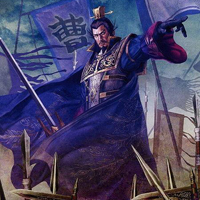
Cao Cao
CBUB Wins: 0
CBUB Losses: 1
CBUB Ties: 0
Win Percentage: 0%
Added by: Skirmisher
Cao Cao ( ; 155 – March 15, 220 ), styled Mengde, was a warlord and the penultimate chancellor of the Eastern Han Dynasty who rose to great power during the dynasty's final years. As one of the central figures of the Three Kingdoms period, he laid the foundations for what was to become the state of Cao Wei and was posthumously titled Emperor Wu of Wei (魏武帝). Although often portrayed as a cruel and merciless tyrant, Cao has also been praised as a brilliant ruler and military genius who treated his subordinates like his family. He was also skilled in poetry and martial arts and authored many war journals.
Cao was born in the county of Qiao (譙, present day Bozhou, Anhui) in 155. His father Cao Song was a foster son of Cao Teng, who in turn was one of the favorite eunuch of Emperor Huan. Some historical records, including Biography of Cao Man, claim that Cao Song's original family name was Xiahou (thus making Cao Cao a relative of Xiahou Dun and Xiahou Yuan, two of his most prominent generals). In Romance of the Three Kingdoms, Cao Song was said to be from the Xiahou clan and was adopted into the Cao family.
Cao was known for his craftiness as an adolescent. According to the Biography of Cao Man, Cao's uncle often complained to Cao Song about Cao Cao's indulgence in hunting and music with Yuan Shao. In retaliation, Cao Cao feigned a fit before his uncle one day, who immediately rushed to inform Cao Song. When Cao Song went to see his son, Cao Cao behaved normally. When asked, Cao Cao replied, "I have never had a fit, but I lost the love of my uncle, and therefore he had deceived you." Henceforth, Cao Song ceased to believe the words of his brother regarding Cao Cao, and thus Cao Cao became even more blatant and perseverant in his wayward pursuits.
At that time, there was a man living in Runan named Xu Shao who was famed for his ability to evaluate one's potentials and talents. Cao paid him a visit in hopes of receiving the evaluation that would earn him some political reputation. Originally, Xu pondered and refused to make a statement; however, under persistent questioning, he finally said, "You would be a capable minister in peaceful times and an unscrupulous hero in chaotic times." Cao laughed and left after hearing the comment. It is worth noting that there are two other versions of the comment in other unofficial historical records: "capable minister in peaceful times, unrighteous hero in chaotic times" (治世能臣, 亂世奸雄) and "sinister foe in peaceful times, great hero in chaotic times."
CBUB Match Record:
| Result | Opponent | My Score | Their Score | |
|---|---|---|---|---|
| Loss | The Black Knight | 3 | to | 19 |
No Fantasy Draft Records Available
